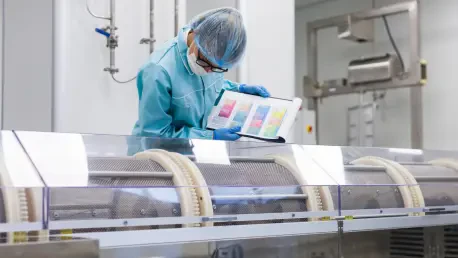As pharmaceutical manufacturing evolves, the integration of machine learning into this domain emerges as a potential game-changer, particularly in predicting powder blend flowability, a key aspect of tablet production. Powder flowability refers to the ease with which powder materials move through the manufacturing process, influencing the efficiency and quality of pharmaceutical products. With the rise of data-driven analysis, pharmaceutical companies are increasingly investing in machine learning techniques to enhance every stage of drug manufacturing, from discovery to production. This exploration into machine learning’s benefits and developments aims to address the complex behaviors of powder materials, mitigate traditional manufacturing challenges, and improve overall efficiency.
Rethinking Powder Flowability in Tablet Manufacturing
Machine learning and artificial intelligence have permeated the pharmaceutical industry, offering solutions for various challenges in manufacturing processes. These technologies advance drug discovery, streamline production, improve outcomes, and reduce complexities and costs. One significant area of impact is the enhancement of powder flowability during tablet manufacturing. Results from a study at the New Jersey Institute of Technology (NJIT) revealed that machine learning models predicted the flowability of individual powder components with an accuracy rate of up to 85% and 87% for blends. According to Rajesh N. Davé, a distinguished professor at NJIT, while machine learning does not inherently alter powder flowability, it plays a crucial role in selecting optimal material combinations and pretreatments to encourage better flow.
Powder flowability is indispensable in various pharmaceutical processes, including blending, dye filling, compaction, and processing. Currently, manufacturers face challenges with inadequate flowability, which can negatively affect content uniformity and result in failure to meet regulatory standards. Traditionally, solutions such as granulation methods—roller compaction or high shear granulation—have been the go-to options to tackle flowability issues. However, these methods often involve additional, cost-intensive process steps, which can burden production costs.
Davé’s team offers an innovative approach by integrating machine learning with a “surface modification technique” to predict powder flow properties more accurately and identify suitable excipients that can improve flowability. According to their findings, when machine learning models predict insufficient flow for a powder blend, manufacturers can enhance the flowability through surface modification using dry coating of nanosized particles, like silica. By applying a silica coating to the active pharmaceutical ingredient (API) powder, which is often fine and cohesive, the overall blend’s flowability improves significantly, presenting a viable and cost-effective alternative to conventional granulation techniques.
Industry Transformation through Collaboration and Innovation
A growing consensus is emerging within the pharmaceutical industry about the necessity of fusing expert human knowledge with advanced machine-learning tools. This fusion effectively tackles complex challenges in pharmaceutical manufacturing, such as predictability in powder formulations. By doing so, manufacturers can achieve a direct compression process that results in smaller pills without the additional steps associated with standard granulation methods.
Prominent pharmaceutical companies like Sanofi and Eli Lilly are pioneering this integration by emphasizing digital transformation through strategic application of AI and advanced analytics throughout their manufacturing and supply chain processes. Sanofi actively works to surpass conventional siloed processes by embracing interconnected digital technologies to optimize production. Meanwhile, Eli Lilly redirects significant investment toward collaborations with academic institutions, specifically Purdue University, to foster pharmaceutical innovation and streamline supply chains smartly. Their collaboration underscores the potential of machine learning when addressing manufacturing challenges by improving material behaviors and process efficiencies, albeit not exclusively focusing on powder flowability.
Reports from Rockwell Automation indicate that nearly all life sciences manufacturers are exploring smart technology, including machine learning, with anticipated uses in quality control and process optimization. Paul Jones from Kalypso, a Rockwell Automation digital services division, suggests that historical batch data could facilitate machine learning predictions of flowability parameters. Such data analysis could help solidify algorithms that optimize upstream process parameters, ultimately refining product flowability and enhancing manufacturing efficiency.
Bridging Human Expertise with Machine Learning
The optimistic prospect of leveraging machine learning in pharmaceutical manufacturing presents a shared understanding that its harmonization with expert knowledge can greatly enhance and redefine powder blend predictions and improvements. Incorporating surface modification techniques with machine learning models articulates a promising approach that pharmaceutical companies might adopt to achieve enhanced flowability without relying heavily on granulation. Both academic and industry experts view these advancements not only as a refinement of current methodologies but as a step towards a more sustainable and efficient production paradigm.
The New Jersey Institute of Technology’s insights highlight how strategic combinations of technological innovations and scientific expertise can pave the way for meaningful transformations. The potential applications are vast, and while challenges remain, such as generating sufficient training data, the trajectory toward improved powder flowability through machine learning seems promising. Companies that embrace these integrated methodologies will likely position themselves advantageously in an increasingly competitive landscape.
Future Considerations and Next Steps
As the field of pharmaceutical manufacturing continues to evolve, the incorporation of machine learning is emerging as a revolutionary force, particularly in predicting the flowability of powder blends, a crucial factor in the production of tablets. Powder flowability describes how easily powdered materials navigate through the manufacturing process, which significantly impacts the efficiency and quality of pharmaceutical products. With an increasing reliance on data-driven analysis, more pharmaceutical companies are investing in machine learning technologies to streamline each phase of drug production, from the initial discovery to the final manufacturing stages. This investigation into the advantages and advancements of machine learning is designed to unravel and address the complex behaviors of powder materials, while also tackling traditional manufacturing challenges. The ultimate goal is to boost overall efficiency and enhance the quality of pharmaceutical products, marking an exciting new era in drug manufacturing where technology plays a vital role in improving outcomes and streamlining production processes.









